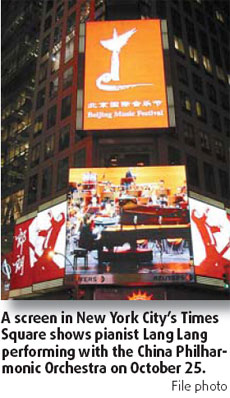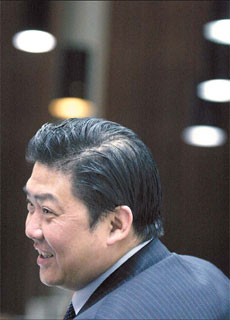Calling the tune
At 7 pm on October 25, seven giant screens in New York City's Times Square showed Chinese pianist Lang Lang performing the Yellow River Piano Concerto with the China Philharmonic Orchestra under the baton of its artistic director Yu Long.
The concert, which was given on September 28 at the Poly Theater in Beijing, was also simulcast on WQXR 96.3 FM, the New York Times' classical music station. It was a celebration of the 10th anniversary of the Beijing Music Festival, which closed on Friday.

Such global attention was unthinkable a decade ago when Yu first dreamed of launching a world-leading music festival in Beijing.
In 1992, then 28-year-old Yu, who was born into a family of musicians in Shanghai, returned from Berlin, where he had been studying conducting for eight years. He was to take the position of the principal conductor of the Central Opera House in Beijing.
In addition to new conducting capabilities, Yu returned with the vision of administrating cultural events to promote classical music and international artistic exchange in China. Soon after his return, Yu organized the inaugural Beijing New Year's Concert, now an annual event, and served as its conductor for three successive years.
But for the ambitious and energetic Yu, hosting one event per year simply wasn't enough. His long-term goal was to hold a Chinese version of Salzburg or Tanglewood.
"China has had a booming economy since the early 1990s, which has had a great international impact," Yu says. "Culture should be its other sphere of influence on the world. We must balance the two. Those Chinese people who seldom go abroad need more opportunities to see, to experience and to broaden their visions of culture."
Yu had many ideas, great confidence and some experience. But it's an impossible mission for one person to take on all of the work of organizing such a big event.
He needed partners. But it was by no means easy for a young man in his early 30s to convince others to invest in a brand-new project.
"I remember clearly one cold winter evening, Yu was wearing a European-styled black overcoat and carried a big suitcase full of his proposals," recalls Jiang Gongmin, current director of the Cultural Bureau of Beijing municipal government, who was the head of the Beijing Music Radio. "He came to me and tried to convince us to get involved in the music festival."
The Beijing Music Festival was mapped out over the lunches Yu and Jiang ate at the canteen of the radio station, which eventually became the co-founding company of the BMF.
Yu took out more than 100,000 yuan ($13,378) from his own pocket to get the show on the road. One of Jiang's colleagues Zeng Wei, who hosted a classical music program on Beijing Music Radio, became the BMF's programming and publicity director. Zeng's small apartment in Beijing's Haidian District was turned into the office.
On October 13, 1998, the first BMF successfully raised its curtain with a concert by Rundfunk-Sinfonieorchester Berlin at the Great Hall of the People. Over the following two weeks, the festival presented 24 concerts ranging from symphonic, chamber, opera and jazz genres. Such big names as Spanish tenor Jose Carreras, Russian conductor Valery Gergiev and Belgium violinist Augustin Dumay performed at the festival.
"It's a great challenge to work out a festival in half a year. But the first BMF turned out even better than what we had expected," recalls Yu.
The BMF was born at a time when classic music was not a significant part of mainstream culture in China. Having little to do with the mass of people, it was like "an oasis in the desert". And while the first festival was a success, few people believed the event could maintain its momentum.
|
Yu Long, the artistic director of the Beijing Music Festival. Jiang Dong |
It is a missionary zeal about the need for a global outlook and about Chinese audiences hungry for the world music that gives Yu a strong drive. His success comes from his ambition of running the world-leading music festival, his talent in administrating it and his hardworking and meticulous approach.
Over the past decade, the BMF presented many historic China debuts. Highlights include Alban Berg's modern opera Lulu, performed by Heliken Opera from Russia, and Mahler's Symphony of A Thousand, performed by 1,000 artists from 11 ensembles under the baton of Yu, and in 2002, the German Staatstheater Nurnberg presented full-length Wagner Ring Cycle in 2005.
The BMF has expanded its influence by inviting overseas musicians and commissioning musicians for the cultural event in Beijing. This, in turn, has enhanced the image of Chinese culture on the international stage.
In 2001, American composer Philip Glass wrote a cello concerto which was performed by cellist Julian Lloyd Webber and China Philharmonic Orchestra. For its 10th anniversary, the BMF commissioned Polish composer Krzysztof Penderecki to score Symphony No 8, which was performed on October 24 by China Philharmonic Orchestra under the baton of 74-year-old Penderecki.
In addition to garnishing the biggest Western names, such as Lorin Maazel, Simon Rattle and Charles Dutoit, the BMF spares no effort in promoting the concept of "Chinese". It presents folk and traditional Chinese music and Chinese operas, entices return visits from established Chinese overseas composers, such as Tan Dun and Chen Qigang, and produces original works.
"BMF aims to be a world-class event, but as a festival held in Beijing, one unique feature is that we promote Chinese musicians and music," Yu says.
During the festival's first few years, Yu and his team were searching for orchestras and soloists. But today, an increasing number of world-leading ensembles and musicians call him and take great honor in receiving invitations. In 2005, the BMF set up the Arts Council to design the annual programs. According to Yu, they usually organize the programs three years in advance, and if there are 25 concerts, there must be at least 50 candidates.
Today, the BMF has developed into a major event in the capital's cultural calendar.
When Kurt Masur was touring China with the London Philharmonic, he made the point that the future of Western classical music now lies in the East. When Simon Rattle conducted the Berlin Philharmonic at the BMF in 2005, he made similar remarks.
Put away of the programs, money is always a fundamental problem for a festival. According to Yu, the budget of the BMF mainly comes from three parts, the government fund, patrons and box-office revenue. Some patrons sponsor not only money but shared their sources with the BMF to develop the festival. For example, this is the third year Audi collaborates with BMF. According to Werner Paul Eichhorn, managing director of FAW-VW Audi Sales Division, they are helping the BMF to collaborate with Salzburg Festival.
Ten years has transformed Yu from a handsome, young conductor into a stout, middle-aged music administrator. But he still appears energetic and keeps a cool head. And he takes great inspiration from Napoleon's famous saying: "Greatness be nothing, unless it be lasting."
(China Daily 11/01/2007 page18)















